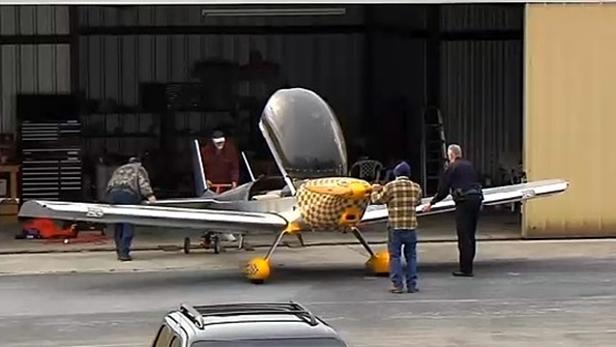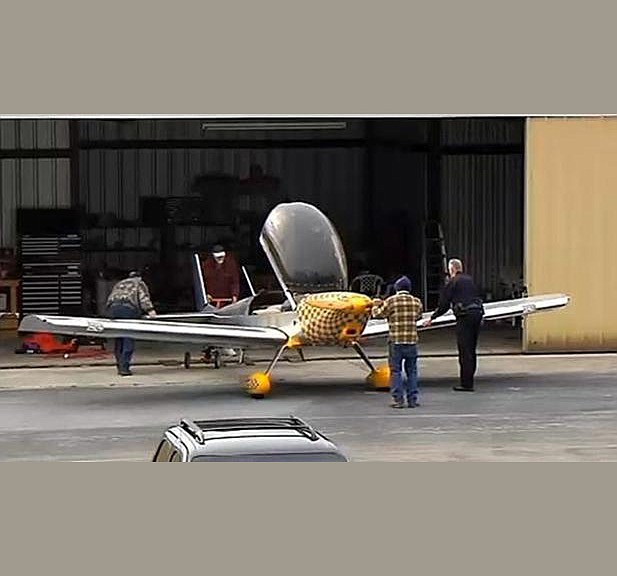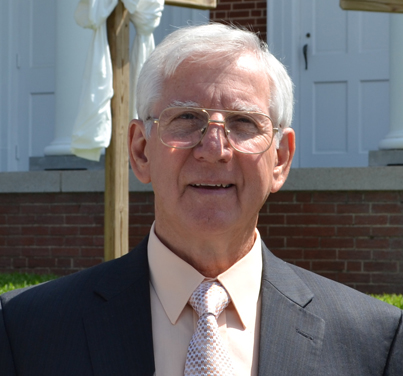 The flight instructor whose student fell out of an aircraft a week ago told the National Transportation Safety Board that he was trying to relatch the kit-built plane's canopy when the craft went into a dive and the pilot was ejected.
The NTSB today released its preliminary report on the incident that led to the death of private pilot David Richardson, retired minister of music at Concord Baptist Church in East Brainerd.
WRCB PHOTO
The flight instructor whose student fell out of an aircraft a week ago told the National Transportation Safety Board that he was trying to relatch the kit-built plane's canopy when the craft went into a dive and the pilot was ejected.
The NTSB today released its preliminary report on the incident that led to the death of private pilot David Richardson, retired minister of music at Concord Baptist Church in East Brainerd.
WRCB PHOTOWhen David Richardson hopped inside his new plane March 29, his family suspects he thought of his grandson.
Richardson used to bring 18-year-old David Jones on flights with him when the boy still lived here. That's why Jones joined the Air Force. And in a little more than a month, come May, Jones would be home from his base in San Angelo, Texas, and his grandfather would want to show off his new purchase, an experimental Zodiac 601 XL.
Richardson bought the plane about a month ago.
But 20 minutes after taking off from Collegedale Municipal Airport, the canopy of the plane opened wide, and it started to nose dive. Somehow, Richardson, 77, fell out. It is an accident that couldn't have been predicted, experienced local pilots and his family say.
In the week since he died, those closest to Richardson have reflected on a man who they say simply couldn't stop learning. A retired music minister, Richardson enjoyed engineering. And mechanics. And guns.
He bought his first computer, a Macintosh, in the early '80s. Before long, his daughter Melodie Jones said, Richardson learned to take the hardware apart and put the pieces back together. Somewhere along the way, he also became a wedding photographer.
But more than any other hobby, Richardson liked flying. He started taking lessons about 10 years ago after retiring from Memorial Baptist.
"Some people get sick and die," said Richardon's son-in-law Jason Jones, 43. "Some people die in tragic ways that are not acceptable by our standards. The way he passed, he would not have regretted it in a minute."
Richardson was interested in flying as a kid. In college, he thought about doing so for the Air Force or the Army -- Melodie Jones, 43, couldn't remember which. It didn't matter. Ministry was the family business.
NTSB report offers details
Despite some early news accounts, Richardson's family insists last week's accident could not have been prevented. He was always careful, Jason Jones said.
A preliminary report from the National Transportation Safety Board, released Friday, and an interview with the instructor pilot with Richardson that day give the following account: Because he would be providing help, the instructor first flew the Zodiac 601 XL by himself for about two hours.
Then, around 3:10 p.m., Richardson and the instructor reviewed the plane's features, and Richardson climbed inside. He was only supposed to fly for about 20 minutes. Just a quick run through. But the engine wouldn't start. Richardson opened the canopy and hollered for help, and someone at the airport provided a battery charger.
Richardson unbuckled his seat belt and began to step out, but the other man told him that no help was needed. The instructor thinks Richardson put on his seat belt. He thinks he heard the familiar click of the buckle. But he isn't sure -- a center console divided the two men, and the instructor couldn't see.
Maybe Richardson didn't get the seat belt fastened properly. Or maybe it malfunctioned. The preliminary report does not say either way, and the family must wait as the investigation continues.
Either way, Richardson and the instructor closed the canopy and took off. Within the next 20 minutes, the instructor realized the plane's canopy was open. It wasn't open wide, just a crack. It's happened before, he said, and neither man panicked.
But gradually, it continued to open wider. The instructor tried to close the canopy. But somehow, he told investigators, the canopy instead swung open all the way.
Then, the plane nose- dived. Investigators don't know how this happened. Soon after, though, Richardson fell out. Investigators don't know how that happened, either.
After Richardson fell, the instructor grabbed the control stick, steadied the plane and landed it.
Airport community
Richardson is the fourth pilot from the Collegedale Airport to die in the last four months. Clarence Andrews, 82, died after a crash in December. That investigation also remains open. Thomas Parson, 70, died in January. And John Linn, 93, one of the two founders of the airport, died in March. The deaths of Parson and Linn had nothing to do with flying.
Nevertheless, all four deaths have affected the tight-knit community. The Collegedale Airport houses about 100 civilian planes, and every day a group of about 10 pilots comes by just to hang out, said Chris Swain, director of airport operations.
They sit around a table and talk, about flying, about old times, about stories that some people choose to believe and others don't. They read the paper and talk about that, too. Andrews liked to fill out the daily crossword puzzles, always in ink, almost always perfect.
"It's difficult," Swain said. "You're acquainted with these people. Some of them are your friends."
Richardson didn't come to the airport every day like others. He couldn't pursue his hobbies as much as he used to once his wife, Earlita, began suffering medical issues about eight years ago. But every Saturday morning he came by, sometimes to talk, sometimes to fly. He was close with the other pilots, and Andrews built the plane Richardson flew last week.
Richardson was interested in flying an experimental plane for a long time, Melodie Jones said. While she and Richardson's three other children, eight grandchildren and three brothers are still suffering, she is comforted by something Richardson used to tell her.
"When I'm up in the sky," he said. "There's nothing else. I'm just totally at peace."
Contact staff writer Tyler Jett at tjett@timesfreepress.com or 423-757-6476.

